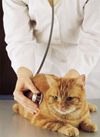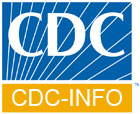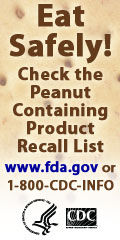Skip directly to the search box, site navigation, or content.
Questions and Answers Related to the Salmonella Typhimurium Outbreak and Pets
 Have any pet foods or treats been recalled?
Have any pet foods or treats been recalled?
Yes, click here to search the FDA Searchable Database* to look for recalled products. Certain pet foods and pet treats may contain peanut butter, including dog and cat treats and bird food.
For those without internet access, telephone 1-800-CDC-INFO (1-800-232-4636), 24 hours a day, 7 days a week, for product recall information from the FDA website and for other information on Salmonella.
If you have a recalled pet product in your household, do not feed it to your pet or other animals. Consumers should avoid feeding products made with peanut butter, peanut paste, or other peanut-containing products to their pets if they are unsure whether these products have been recalled.
How do I know if my dog or cat has Salmonella?
- Dogs and cats that become ill from Salmonella generally will have diarrhea that may contain blood or mucus. Affected animals may seem more tired than usual, and may have a fever or vomit.
- Some cats do not have diarrhea, but will have a decreased appetite, fever, and excess salivation.
- Some dogs or cats may have Salmonella but may not appear to be sick.
If your dog or cat has these signs of illness or you are concerned that your pet may have Salmonella, please contact your pet's veterinarian. Let your veterinarian know if your dog recently consumed a recalled product. Do not feed your pet any more of the recalled product. Dispose of the product immediately.
How are Salmonella infections diagnosed and treated in dogs, cats, and other animals?
See your veterinarian. A veterinary examination and laboratory tests can be used to diagnose Salmonella in animals. Salmonella infections may require prompt treatment with supportive care and fluids. Treatment of Salmonella infections with antibiotics may be necessary for severe cases and hospitalization in a veterinary clinic may be required. Your pet's veterinarian is the best source of advice on your pet's health.
What can I do to prevent the spread of Salmonella from my pets?
Salmonella infections are a zoonotic disease meaning that the infection can spread between animals and people. Salmonella is transmitted from animals to humans and humans to humans by the fecal oral route. Salmonella can be passed from one person to another through poor hygiene. Salmonella can be passed from one person to another by not properly washing hands after using the bathroom or after changing a diaper.
Salmonella can be shed in the stool of pets for 4 to 6 weeks after infection. If your pet is diagnosed with Salmonella, please talk to your veterinarian about taking precautions to minimize spread of this germ. Use a plastic bag to pick up dog stool or clean cat litter boxes daily. All pet feces should be disposed of in a sealed trash can. Always wash your hands right after handling pet feces or cleaning up after pets. Wash your hands as directed in the handwashing instructions. A mild bleach solution can be used to clean areas that may be contaminated with Salmonella.
If a person in your household become ill, contact your physician immediately.
Follow these simple guidelines to prevent getting a Salmonella infection from your pet:
- After contact with animal feces (stool), wash your hands well with soap and running water. Wash your hands as directed in the handwashing instructions.
- Be sure to wash your hands with soap and running water after handling or feeding your pet. Wash your hands as directed in the handwashing instructions.
- Clean up after your pet. If you have a cat, scoop the litter box daily and dispose of the stool in a tightly sealed plastic bag. If you have a dog, clean up the stool while on walks or from the yard and dispose of the stool in a tightly sealed plastic bag.
- Do not share food with your pets.
My dog has eaten a recalled product. Neither the dog nor any of my household members are ill. I still have the product. What should I do?
Dispose of the product immediately. If a person in your household becomes ill, contact your physician immediately. If your pet develops diarrhea or appears sick, contact your pet's veterinarian.
See the FDA web site for a list of recalled products*.
My dog ate a recalled product and someone in my household became ill. We still have the product. What should I do?
Veterinarians and other individuals can report complaints about pet food and other animal feed to the FDA by calling the FDA consumer complaint coordinator in their state. Contact information can be found at the list of FDA’s Consumer Complaint Coordinators*. Reports should include product details such as lot number, brand name, expiration date, manufacturer or distributor, and location of purchase. Reports also should include medical information—including a veterinarian’s report and diagnosis, signs of illness, numbers of animals that do and do not have the signs, and complete medical histories. Additionally, veterinarians should consider contacting the manufacturer so any necessary investigation can be initiated immediately.
Dispose of the product immediately. If anyone in your household becomes ill with diarrhea and has bloody stools, fever, or diarrhea lasting more than 3 days, he or she should seek medical care. If your pet develops diarrhea or appears sick, contact your veterinarian.
See the FDA web site for a list of recalled products.
What can I do to prevent the spread of Salmonella from my pets?
Salmonella can be shed in the stool of pets for 4-6 weeks after infection. If your pet is diagnosed with Salmonella, please talk to your veterinarian about taking precautions to minimize spread of the germ. Be careful to pick up stool and dispose of properly. Wash your hands after petting and cleaning up after your pet, particularly before eating or preparing food. A mild bleach solution can be used to clean areas that may be contaminated with Salmonella.
Follow these simple guidelines to prevent getting Salmonella from your pet:
- After contact with animal feces (stool), wash your hands well with soap and running water.
- Clean up after your pet. If you have a cat, scoop the litter box daily and dispose of the stool in a tightly sealed plastic bag. If you have a dog, clean up the stool while on walks or from the yard and dispose of the stool in a tightly sealed plastic bag.
- Do not share food with your pets.
- Be sure to wash your hands with soap and running water after handling or feeding your pet.
How should I dispose of a recalled product, including pet food or treats?
 Any product that is on the recall list should be disposed of in a safe manner. If you have a recalled pet product in your household, do not feed it to your pet or other animals. Any recalled product should be thrown away to prevent Salmonella infections in humans, pets, or other animals. This product should be disposed of in a closed plastic bag and placed in a sealed trash can to prevent people or animals, including wild animals, from eating it. If you touch the product, wash your hands as directed in the handwashing instructions.
Any product that is on the recall list should be disposed of in a safe manner. If you have a recalled pet product in your household, do not feed it to your pet or other animals. Any recalled product should be thrown away to prevent Salmonella infections in humans, pets, or other animals. This product should be disposed of in a closed plastic bag and placed in a sealed trash can to prevent people or animals, including wild animals, from eating it. If you touch the product, wash your hands as directed in the handwashing instructions.
Information is also available for your pet's veterinarian. Please see Information for Veterinarians regarding Pets and the Peanut Butter and Peanut-Product Recall.
Content Source: National Center for Zoonotic, Vector-Borne, and Enteric Diseases (ZVED)
Languages
Quick Links
Contact CDC


